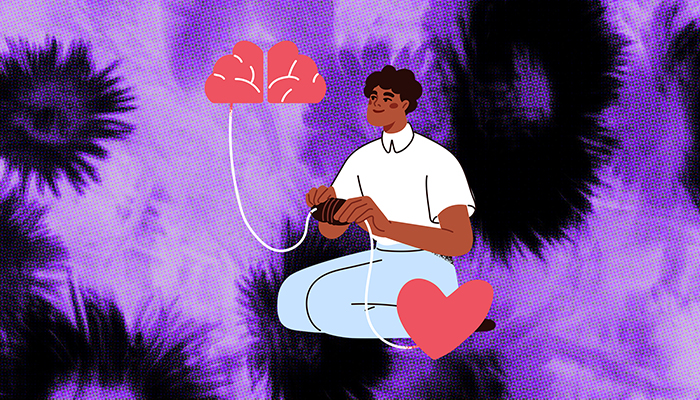The majority of recovery stories I’ve heard over the last few years have had one thing in common —a singular experience that changed everything. The people telling the stories woke up horrified that they had driven drunk with their kids in the car the night before, they’d lost a romantic relationship, or they landed themselves in a hospital. Big or small, there was a clear turning point that caused them to put their foot down and give up their pursuit of the high or the bottle.
"In my story, there is no dramatic rock bottom—just the slow, crushing realization that the same things that had once given me freedom, eventually controlled everything I did." - Cari Royer
By the time I was fifteen, I was hitching rides to San Francisco to try to weasel my way into gay bars and weekly dance parties. Before the city gave its final eviction notice to multiple generations of queer culture, all you had to do was show up. My friends and I would make our way to the Castro district with nothing more than a few dollars scraped together between us and a willingness to follow wherever the night might lead. We were far from the legal drinking age, but that hardly mattered.
The bars would inevitably be overflowing, spilling queers of all shapes and sizes into the packed streets. Butch women with overly pomaded hair would pull flasks from their coat pockets for me to sneak sips from. Hands adorned with long, freshly painted nails and remnants of ostrich feathers would hand me joints to smoke in dark alcoves. Back at my high school, I was known as little more than “are you a boy or a girl”—a sentiment that hits different coming from drag queens handing you spliffs laced with cocaine.
In San Francisco, anti-cross-dressing laws went into effect in 1863 and were enforced for some 125 years. By the start of the 1960s, the decade that saw the Compton’s Cafeteria and Stonewall riots, 45 US cities had adopted similar ordinances. Sodomy was also considered a felony in all 50 states. It was against this backdrop of criminalization and police violence, that queer sexuality and gender expression were relegated to indoor spaces such as bars and clubs. Just 12 years after Stonewall, the AIDS epidemic ushered in even greater political and legislative stigma toward gay men and trans women. That very same year, Absolut vodka became the first major brand in the world to launch a marketing campaign targeting LGBTQ+ consumers. That campaign still exists to this day, 40 years later.
Shame and stigma most often act as the gatekeepers of self-awareness. At the same time, for those of us who are queer and develop disordered relationships with substances, it is most often the easiest, most effective, and most accessible coping mechanism that we learn. A study published in 2019 analyzed data from over 10,000 trans healthcare patients and found that 58 percent had at least one psychiatric diagnosis. That’s over four times the amount of the general population control group. The analysis also found that of that 58 percent, major depressive disorder was the most common diagnosis. Another study published in 2016 found that when given the choice to consume alcohol, depression-like behaviors improved in mice with depressive disorders. The mice that had balanced brain chemistry didn’t show any benefits from the consumption of alcohol.
Basically, we self-medicate because it works. The trouble begins the moment it stops working. Study after study that I have read involving mental health disorders and substance use all say the same thing: it is consistently difficult to understand the relationship between mental illness and substance use disorders. The pathways in our brains that are responsible for multiple mental health conditions are the same pathways responsible for substance use disorders. This means at a certain point, our self-medicating actually begins to perpetuate our depression, anxiety, and other mental health issues. Not only that, but heavy or consistent substance use can actually cause mood disorders like depression and generalized anxiety disorder in people that didn’t otherwise experience those symptoms. The relationship between mental health and substance use is progressive—meaning, substance use disorders exist on a spectrum. Some people begin questioning their substance use long before the symptoms and consequences resemble anything like the images we might have of “addicts” and “alcoholics”. The realizations that I slowly came to over years and years of substance use led me to one conclusion: if I didn’t learn different ways of coping, I would never be free of this cycle.
I’d love to say that I decided to get sober and life has been beautiful since, but what I found in the first days and weeks of sobriety was that I no longer knew (and in some cases never learned) how to carry out basic human functions. I didn’t know how to socialize. I didn’t know how to have sex. I didn’t know how to fall asleep. I felt completely frozen by my inability to navigate the world in such new, and honestly, terrifying ways. I was also suddenly cut off from most of my community and support systems because I could no longer attend events and be in spaces where most queer community building happens. My energy levels and emotions were completely erratic. After so many years of using substances to suppress and avoid uncomfortable feelings, everything came up.
That experience, I’ve learned, is pretty consistent among newly sober people. From a neurobiological standpoint, it takes about a month (give or take) for our hormones and brain function to start balancing out. Unfortunately, it’s not always possible to return to a pre-substance use brain state. It’s also common in the weeks, months, and even years after becoming sober, for people to begin to notice symptoms of undiagnosed disorders and neurodivergence. The most common new diagnoses that I’ve heard from folks are ADHD and Autism Spectrum Disorder (both of which I became aware of and sought treatment for only after becoming sober). Some people find it necessary or helpful to begin taking various forms of medication in the early stages of sobriety—antidepressants, benzodiazepines, or various medications used in medication-assisted treatment such as suboxone, buprenorphine, or naltrexone.
In the beginning, I was really hesitant to seek help from Twelve-step groups like AA (Alcoholics Anonymous) or NA (Narcotics Anonymous). Both of my parents brought me with them to meetings while I was growing up and for the life of me, I could not imagine myself back in those spaces. If you want the most stigmatized, sensationalized and downright cliche version of sobriety, AA is it. The cigarettes, the mustaches, the styrofoam cups—it wasn’t my scene.
But as time went on, staying away from substances became more and more isolating. I knew that if I couldn’t figure out how to create a sober community, I wouldn’t be able to continue exploring sobriety for myself. Don’t get me wrong, there is still plenty to criticize about these programs. Meetings can be difficult and off-putting. People questioning their relationship to substances often show up and leave convinced that they don’t actually belong there. Some people in the rooms consider gender and sexual identities to be outside issues that shouldn’t be discussed, even though experiencing marginalization based on those identities often leads people to misuse substances in the first place. On one occasion I was even physically prevented from entering a meeting for women, transgender, and gender non-conforming folks; I was interrogated about whether or not I was a cis man. “God” is talked about A LOT. The literature was written by a bunch of cis white men in the 30s and it reads as such.
"For as many problematic aspects that 12-step programs present, though, there are queers and trans people within these spaces challenging them. And for all of the inclusivity that the original texts lack, there are some very central concepts running through them that speak to the experience of struggling with substance use disorders and valuable tools to aid in that struggle." - Cari Royer
Plus, despite our contemporary understanding, AA has always been really gay. More recently, the COVID-19 pandemic kind of revolutionized twelve-step programs. When meetings suddenly became accessible from anywhere in the world, so many radical, examined, and inclusive queer meetings began springing up left and right. Finding my people in those virtual spaces completely changed my experience of sobriety.
Finding a supportive community of any kind is crucial. Whether that comes in the form of queer 12-step programs, secular programs like SMART Recovery, alternative spirituality-based recovery programs like Recovery Dharma, or any of the various app and web page-based moderation programs like Tempest and Monument —which are both incredibly queer and trans-friendly.
The important thing to keep in mind is that what has worked for me might not work for everyone else. I’ve found that abstinence is what I need to heal and repair the parts of myself that I neglected through heavy substance use. Plenty of other folks find mindful and intentional moderation is most useful. We are different. Therefore our relationships with substances, our relationships to sobriety, and ultimately, our paths back to ourselves all look different.
It’s estimated that 86 percent of queer people with substance use disorders do not receive treatment. That number is staggering. While I’m sure this is due to a dire lack of access to resources, we also have a responsibility to question the ways we normalize substance use as part of our community, why we allow predatory marketing campaigns to sponsor our events, and to consider not only who our spaces are keeping out, but also who they’re keeping in.
__
FOLX Health is the first digital healthcare company designed by and for the LGBTQIA+ community. Our services include virtual primary care, gender-affirming hormone therapy including estrogen and testosterone (HRT), mental health care, sexual and reproductive health care, preventive care, and fertility consultations. FOLX memberships give you access to LGBTQIA+ expert clinicians, peer support, thousands of LGBTQIA+ resources, and more. Whether you’re lesbian, gay, bisexual, transgender, queer, gender non-conforming, or nonbinary, you can find LGBTQIA+-specialized health care that helps you meet your wellness goals. FOLX Health is health care that's queer all year. Get all the benefits of becoming a FOLX member and sign up today!



